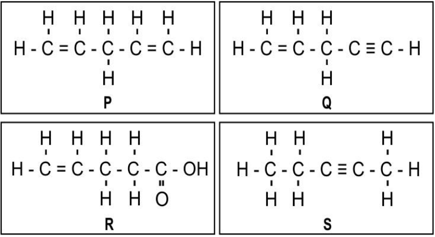Chemical Properties of Carbon Compounds
Chemical Properties of Carbon Compounds: Overview
This Topic covers sub-topics such as Chemical Properties of Carbon Compounds, Formation of Coal and Petroleum, Combustion of Carbon Compounds, Combustion of Coal and Petroleum and, Addition Reactions of Hydrocarbons
Important Questions on Chemical Properties of Carbon Compounds
One mole of which of the following compounds requires moles of hydrogen to form a saturated hydrocarbon by catalytic hydrogenation?
The reaction of methane with chlorine in the presence of sunlight is a type of _____ reaction.
Define substitution reactions and write the reaction of methane with chlorine in the presence of sunlight.
Explain addition and hydrogenation reactions of hydrocarbons and write any one use of hydrogenation reaction.
Write the addition reaction of unsaturated hydrocarbons.
Write the oxidation reaction of ethyl alcohol.
Write the process involved in the formation of petroleum fuels.
Write the formation process of coal.
Write the colour of flames given by the combustion of saturated and unsaturated compounds.
_____ colour flame is produced on combustion of saturated hydrocarbons.
_____ dioxide gas is released by the combustion of coal and petroleum.
Carbon dioxide gas is not released in the combustion of coal.
Which of the following gas is released in combustion of coal.
Write the types of reaction in which organic compounds take part.
Write any one chemical property of carbon compounds.
How unsaturated hydrocarbons burns in the air?
The saturated hydrocarbons generally burn in air with a blue, sooty flame.
The compounds which do not undergo hydrogenation:
Observe the following chemical equation of carbon compound.
Name of the chemical reaction and the product ‘x’ respectively :
Which one of the following is used as the antiknock compound?

